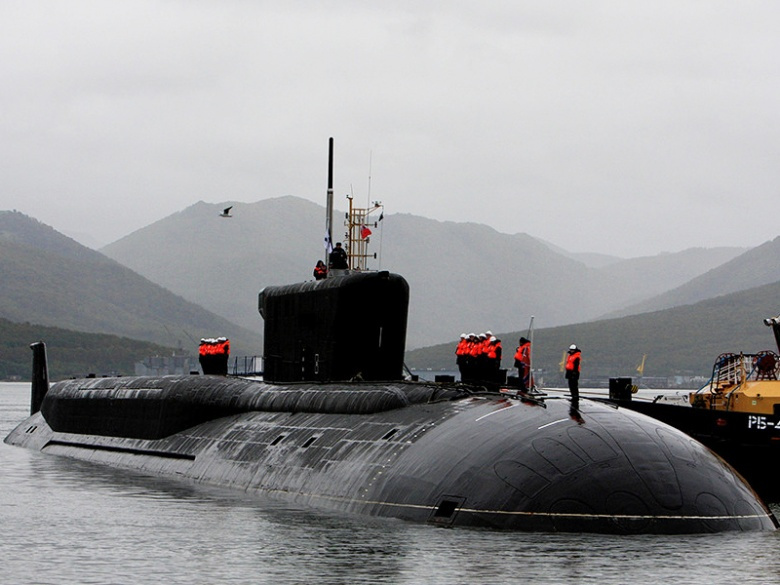Α)Russian Boomers Set to Conduct Largest Live-Fire Drill in 25 Years



The Russians want to confirm that the new submarines will be able to launch all sixteen ballistic missiles in sequence from a depth of 164ft while the boat is operating at sea states of between six and seven. At those sea states, waves can be anywhere from 13ft to 30ft in height.
This is the second time Russia has attempted to launch all sixteen missiles sequentially from a Borei. According to Izvestia, Vladimir Monomakh made the attempt last year but aborted after taking only two shots because one Bulava missile self-destructed while the other did not meet accuracy standards even though it reached the test site in Kura. The remaining Bulava missiles were sent back to the manufacturer where it was discovered that some of the missiles were defective due to poor workmanship. Thus far, the Russians have not had much luck with the Bulava, with only fifteen out of twenty-four launched being completely successful, Izvestia reports.
The last time Russia successfully launched all sixteen missiles from a ballistic missile submarine in sequence was during the August 1991 Begemot II exercise. During that test—the last ever conducted by the Soviet Union—a Project 667BDRM Delfin-class (NATO: Delta IV) ballistic missile submarine called Novomoskovsk successfully launched sixteen RSM-54 Skif ballistic missiles.
Because of the previous failures, the Russians are watching the performance of the Bulava’s rocket motor closely during this test. Russia or the United States would only ever launch every missile onboard a boomer during a full-scale nuclear war—either as a retaliatory strike or launching an offensive first strike.
Dave Majumdar is the defense editor for the National Interest. You can follow him on Twitter: @davemajumdar.
Image: Wikimedia Commons/Mil.ru.
#AseanMilitaryDefenseReview

The
Russian Navy is set to conduct a massive live-fire nuclear exercise on a
scale not seen since before the collapse of the Soviet Union.
Two new 24,000-ton Project 955 Borei-class ballistic missile submarines are participating in the exercise. Of the two Northern Fleet boats participating—Yury Dolgoruky and Vladimir Monomakh—one will sequentially launch its entire payload of sixteen RSM-56 Bulava missiles in a drill that replicates the Soviet-era Begemot II exercise which took place in August 1991—reports the Russian media outlet Izvestia. It’s not clear which of the two boomers will conduct the test.
Two new 24,000-ton Project 955 Borei-class ballistic missile submarines are participating in the exercise. Of the two Northern Fleet boats participating—Yury Dolgoruky and Vladimir Monomakh—one will sequentially launch its entire payload of sixteen RSM-56 Bulava missiles in a drill that replicates the Soviet-era Begemot II exercise which took place in August 1991—reports the Russian media outlet Izvestia. It’s not clear which of the two boomers will conduct the test.
The Russians want to confirm that the new submarines will be able to launch all sixteen ballistic missiles in sequence from a depth of 164ft while the boat is operating at sea states of between six and seven. At those sea states, waves can be anywhere from 13ft to 30ft in height.
This is the second time Russia has attempted to launch all sixteen missiles sequentially from a Borei. According to Izvestia, Vladimir Monomakh made the attempt last year but aborted after taking only two shots because one Bulava missile self-destructed while the other did not meet accuracy standards even though it reached the test site in Kura. The remaining Bulava missiles were sent back to the manufacturer where it was discovered that some of the missiles were defective due to poor workmanship. Thus far, the Russians have not had much luck with the Bulava, with only fifteen out of twenty-four launched being completely successful, Izvestia reports.
The last time Russia successfully launched all sixteen missiles from a ballistic missile submarine in sequence was during the August 1991 Begemot II exercise. During that test—the last ever conducted by the Soviet Union—a Project 667BDRM Delfin-class (NATO: Delta IV) ballistic missile submarine called Novomoskovsk successfully launched sixteen RSM-54 Skif ballistic missiles.
Because of the previous failures, the Russians are watching the performance of the Bulava’s rocket motor closely during this test. Russia or the United States would only ever launch every missile onboard a boomer during a full-scale nuclear war—either as a retaliatory strike or launching an offensive first strike.
Dave Majumdar is the defense editor for the National Interest. You can follow him on Twitter: @davemajumdar.
Image: Wikimedia Commons/Mil.ru.
=============================================
Β)Indonesia to Receive First Russian Su-35 in 2018
MOSCOW,
— Earlier in March, Indonesian Defense Minister Ryamizard Ryacudu
announced Moscow and Jakarta would sign in April a contract for the
delivery of 10 Russian Su-35 Flanker multirole fighter jets to replace
Indonesia’s fleet of F-5 Tigers.
The
manufacturer had produced 14 Su-35, several Su-30МК2 aircraft for
Vietnam and modernized Su-27 in 2015, the Russian Izvestia newspaper
reported.
"Today,
a full transition of the enterprise to the production of modern Su-35
is on the agenda. However, this will not affect the queue. The plant is
due to produce 50 aircraft for Russia's Aerospace Forces within five
years, and 24 for China.
Indonesians could expect to receive two jets in 2018 in a best-case scenario," the source told the newspaper.
The
Su-35S is a 4++ generation one-seater, an upgraded version of the Su-27
multirole fighter with features comparable to a 5-generation aircraft.
It is characterized by supermaneuverability and is equipped with new
avionics, a modern radar and advanced engines. It can accomplish
incredible tricks without deceleration and can fly at a speed of 2400
kmph, outpacing all rivals in its class. The warplane is armed with 30mm
guns, a huge number of missiles and rockets.
The Russian Air Force Sukhoi Su-35 Flanker Multirole Air superiority fighter.
http://goo.gl/GTXxhi


Δεν υπάρχουν σχόλια:
Δημοσίευση σχολίου